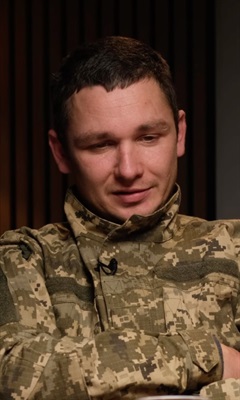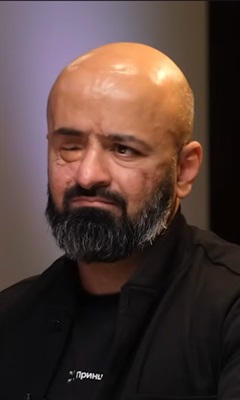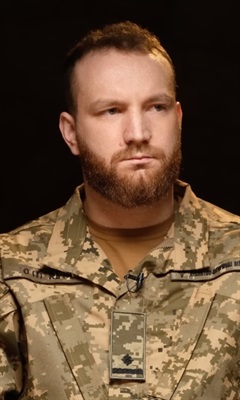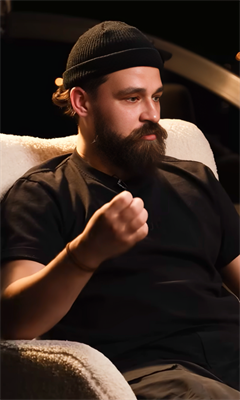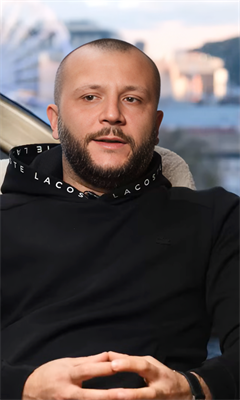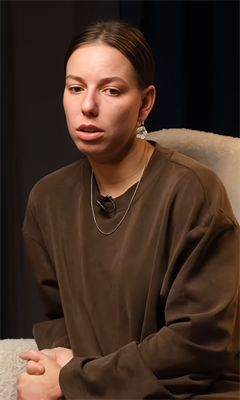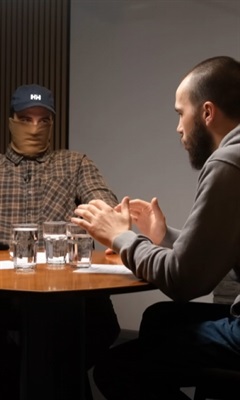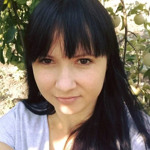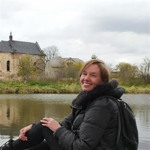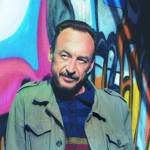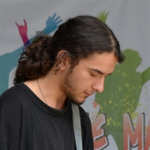I had to go through 25 Russian roadblocks on my way to freedom, they cut open even period pads
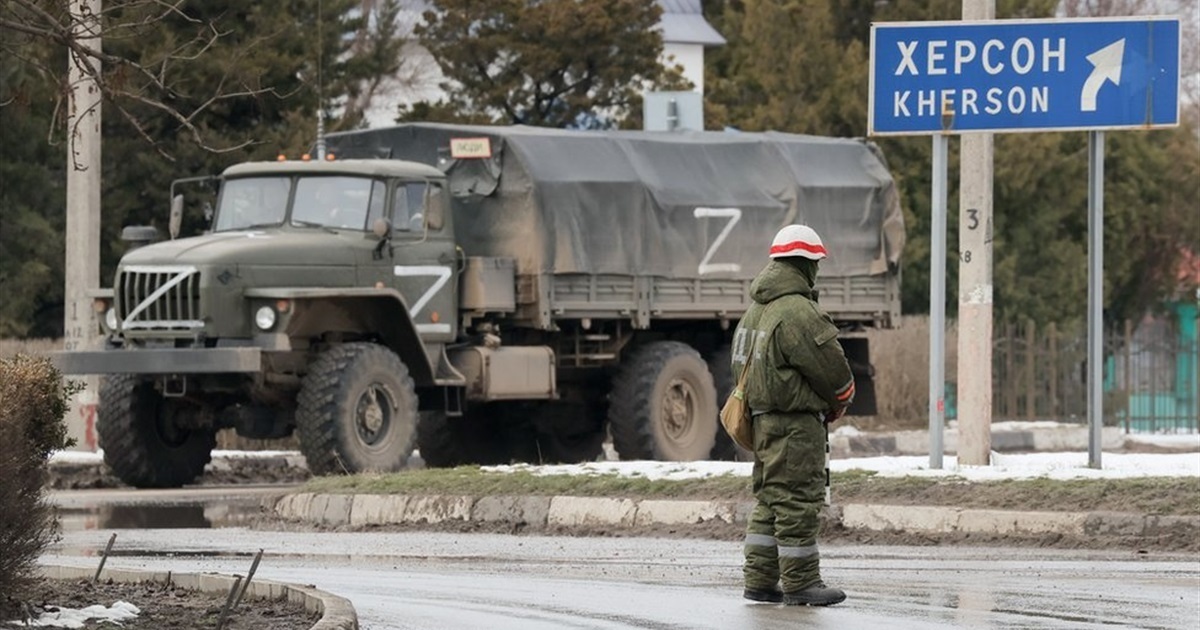
February 22 was the last time I spoke to my son
How did I learn about the outbreak of war? I heard an explosion, with the sound being something similar to what a train produces when coming to a full stop. However, the sounds I heard were so frequent that I knew at once it wasn’t a train. I ran outside and saw a blaze coming from Chonhar direction. That’s when my phone rang, and, on the other end, through explosions, I heard my husband’s voice telling me: “The war broke out, 500 Russian tanks are coming our way.”
I didn’t cry or anything. When someone is in a deep shock, their body produces extreme amounts of adrenalin that they are simply incapable of such a weakness as tears. The only people that I had fear for were my husband and my son. I couldn’t reach my son on the phone, the last time I spoke to him was February 22. I never heard from him since then.
This is how my life under occupation began. There were no [air raid — translator’s note] sirens and I could even call our life more or less peaceful, compared with the rest of Ukraine — safe for that huge tension that was practically palpable.
You could only buy something if you paid in cash, they spotted accepting bank cards after just a few days. So if you were lucky enough to have cash on you, you could buy something to eat — or you went hungry if you weren’t that lucky. For probably another several weeks there was an option to withdraw money from a PrivatBank ATM, so there was a huge line to tat ATM all day, from the early morning hours. Like, about 300 people.
![[depicted is the sign on the wall saying “entrance to the shelter” — translator’s note]](/upload/article/o_1g8g09fli1s8s1dcqp9lffsl7t2a.jpg) [depicted is the sign on the wall saying “entrance to the shelter” — translator’s note]
[depicted is the sign on the wall saying “entrance to the shelter” — translator’s note]
The local bakeries kept working, so we had bread in the town. People from the countryside brought some meat for sale, keeping the pre-war prices. But as for the rest of the groceries, the prices went about three times higher, UAH 500 for one kilogram [2.21 lbs, — translator’s note] cooked sausage, UAH 75 for a 1 kg of sugar, while the prices on hygiene products skyrocketed. UAH 200 for one deodorant! For the first several days, there were long lines to each pharmacy, but once those ran out of medicine, the lines dissolved.
Humanitarian crisis never bothered the occupation authorities, they never brought any supplies to our town. They wouldn’t let anyone bring humanitarian cargo, either, not even the medications. Instead, they took extra care to put their military roadblocks on each corner. There was a lot of military and equipment, and they enforced a curfew, too. No one knew what the next day would bring us.
Every day I would take the route to my workplace, from Novooleksiivka and Henichesk, and constantly felt that never-ending psychological pressure. You never knew what was awaiting you at each of those roadblocks. We were stopped, and our documents, bags, and purses were thoroughly checked. Male passengers had to deboard the bus and undress (they were looking for some specific tattoos). They also always checked our surnames with some lists they had on them.
This is what it looked like. At the checkpoint, they [the Russian soldiers — translator’s note] walk in, and everyone on the bus has to show their passport. They say, “Just you wait. Very soon, you’ll be giving up your passports in exchange for Russian passports… or won’t you?” Followed by silence, as everyone is afraid to speak up. If you said something they didn’t like, you would be taken off the bus and no one knew where they took you next. On one occasion, they didn’t like something about me, and they told me to get off the bus. My knees were about to buckle from the intense fear while they checked my passport, and held it to the light… And those wild questions they asked, “Why do you have to go to work? Are you happy with us liberating you?”
The medical college where I worked closed down, so I began working for a private optometrist. One day, they [the Russians — translator’s note] came into our office and said, “You have to be ready to work by our rules. Soon, everyone will pay in Rubles, nobody needs your Hryvnias. We will take be checking on your operation, mind that. No objections accepted.”
I hardly slept during that month and a half, as I lived alone with my dogs. The looting began, they started scoping out people’s homes. It was scary, too.
I began fearing for my safety. Having two military servicemen in my family, I knew that they [the Russians — translator’s note] would come after me.
And then, they started making rounds, searching people’s yards for the presence of the Ukrainian military. The Russians had some lists, and I can only speculate where they got the info on those lists from. Those lists could be drafted by people close to the occupation administration, those who had defected.
They came to my acquaintance’s home, a woman with two children, who was also a military wife. They turned her home upside down, trying to find something. It all lasted several hours, and everyone knew she was there, but… who would go in there to defend her? I don’t know what happened to the woman and her kids, I was too scared to be asking around.
And one night, we heard assault rifles rounds: they [the Russians — translator’s note] found out that a Ukrainian military veteran was living in one apartment building, so they went there, ordered his neighbors out, and blew up his apartment with a flame gun, killing that young man. The neighbors kept silent about it, too afraid to even say something. What if someone reported on you as [an enemy — translator’s note] sympathizer, that you didn’t agree with what they [the Russians — translator’s note] were doing?
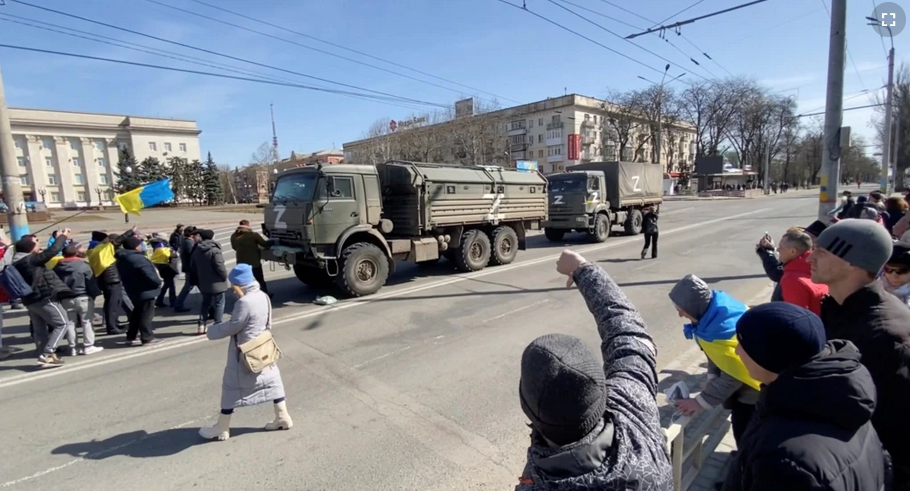 Photo by: ЕRА
Photo by: ЕRА
Automatic fire rounds were frequently fired in the village. Those lists were haunting me. Whether you were staying home, waking down a street, or going to work — you never know whether you were on their lists. I started fearing for my safety; in addition to fearing for my husband and son with whom I had no contact since the invasion began, I started feeling fear for myself.
With every passing day, there were fewer and fewer people in the streets. On social media, the local public started posting ads from transport operators offering to pick up people from certain meeting points and take them to Zaporizhzhia. I dialed the number listed on one such ad and was told that the bus was leaving in two days — on Friday, April 8.
Just say it, and we’ll shoot him right away
There wasn’t much packing to do: a small trolley case, documents, and a purse. That was all, I never intended to take more stuff. So I exited the house when it hit me: that was my home, in that place under occupation. I was locking my door likely to never unlock it again. But was that really my home, If I could never have my family over?
Going to Zaporizhzhia, through Melitopol, was the only way to leave Henichesk. On our way, we had to pass several villages in Zaporizka Oblast (Zaporizhzhia region) that were also under Russian occupation. It was only at the end of the journey that we would enter the Ukrainian territory controlled by the Government.
A convoy of four minibuses lined up, with some cars following. Back then, they [the Russians — translator’s note] still allowed men to leave. There was a young family with three kids in one of the vehicles, with a man behind the wheel.
In the group that gathered near an ATB [one of Ukraine’s largest retail chains — translator’s note] supermarket, everyone realized that the trip would be dangerous. It was rather quiet where we were, save for those “green men’ walking around with their lists. There were hostilities where we were going, and nobody could guarantee our safe arrival.
The first roadblock was just outside of town. They [the Russians — translator’s note] knew very well that we were leaving, and each vehicle underwent a thorough search. They opened the trunks and went through people’s personal belongings. They even inspected ladies’ handbags, never disdaining to even go through your supply of period pads and lipsticks. That was legit disgusting. And then, at the next checkpoint, it was all over again. They went on with their nonsense, “Where are you going? Like, we came here to liberate you!” And once, I was told to “take care”.
Everyone just kept silent when they [the Russians — translator’s note] didn’t speak to anyone specifically. When they demanded answers, everyone would say something like “I’m going to visit my mother”, or “I’m paying my son a visit”. Nobody tried to be a hero, despite everyone seemingly being on edge. The people kept silent.
On our minibus, there was that woman with her 16-year-old son. The boy was tall, yet clearly a teenager. But how can you know what’s on the mind of a person holding an assault rifle? It seemed to me that that mother was more afraid than the rest.
It said on my passport that I was born in Donetsk Oblast (Donetsk region). Some roadblocks were guarded by fighters from the [so-called — translator’s note] PDR [“Donetsk People’s Republic — translator’s note]. They were surprised, and kept telling me, “Wow, Donetsk Oblast! So, where are you going? Why are you leaving?”
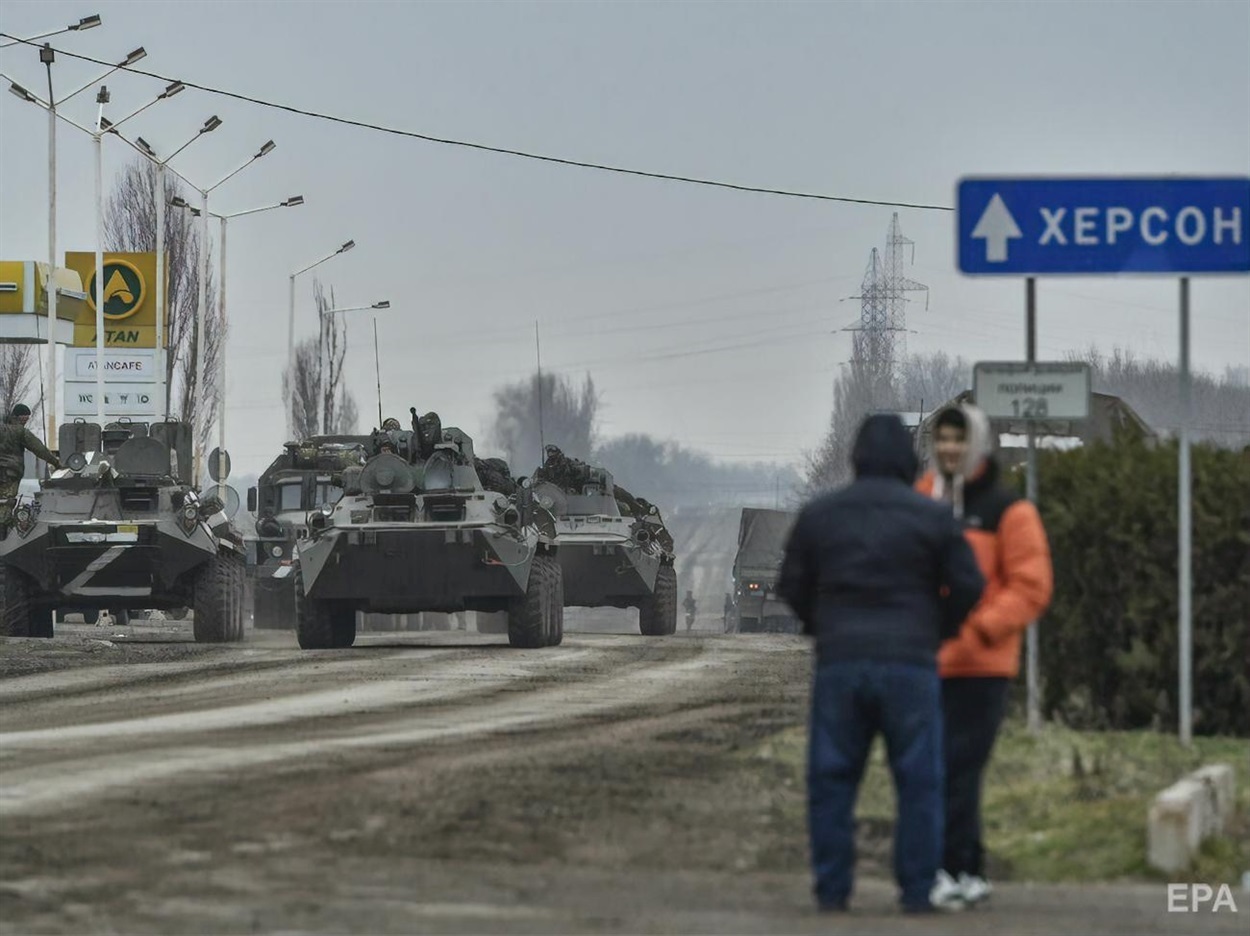
Of course, there was some Russian military who just checked our documents and wished us a good trip, however, there were an awful lot of inadequate people. One of them was trying to start trouble with our driver, repeatedly asking him how much he had charged us. Then, he started demanding answers from the passengers, yelling: “He’s a looter! He overcharges you just to take you there! And do you know what is awaiting you on the other side? Just say it, and we’ll shoot him right away!” The driver mostly kept silent, saying from time to time: “Come on, everything is fine, I’m just a driver transporting peaceful civilians! Aren’t they free to go anywhere they want?”
As for us, we were shaking profusely. As a medical doctor, I saw that that “green man” was seriously messed up in the head.
To reach the territory, controlled by the Ukrainian Government, we had to pass 25 checkpoints in total — up to the point where the road turned from Berdiansk to the Zaporizhzhia freeway. We were proceeding very slowly, and those 200 km [124.3 mi] seemed endless. Going forward — stopping at another checkpoint — being questioned — being searched… There were plenty of burnt vehicles along the road, I don’t know how many. All I could think about was that every one of those vehicles once carried people who, like myself, had tried to travel that same road I was on.
People had to walk alongside buses, while things kept exploding all around
We stopped at yet another roadblock and were standing in line, slowly moving forward. That’s when I saw that car: a perfectly unscathed vehicle, except for two bullet holes in the windshield, one from the driver’s side, another one from the shotgun passenger’s side. Just two shots, point blank. Do you see? That wasn’t some mortar shelling or something, those were two gunshots.
Some people standing on that road told us, “Keep driving, pass this place quickly. Don’t you see that yesterday, a car was hit on the very spot you’re standing? That car burned to ashes. Here it is, towed to the side of the road.” But how can you keep driving when there’s a line? We couldn’t proceed before they [the Russians — translator’s note] finished checking the vehicle in front of us, nobody could.
There were roadblocks at every fork in the road, at every intersection. There were a lot of cars moving towards Zaporizhzhia, so our convoy immediately expanded and became enormous. We were moving very slowly, and the flow seemed endless. The oncoming traffic was scarce; people obviously preferred leaving the territories under occupation to going there.
Then we reached the final Russian roadblock before the free Ukrainian territory began. We didn’t yet reach Zaporizhzhia. There were two evacuation buses from Mariupol in front of us, and they [the Russians — translator’s note] wouldn’t let them pass. That “green corridor” they [the Russians — translator’s note] had promised to provide, was never offered. Those buses were intact, but the people inside were exhausted.
Of course, they didn’t let us pass, either. According to our driver, that was a typical situation. You can’t imagine that feeling: we had traveled 200 km [124.3 mi — translator’s note], and had to literally go another several hundred meters [600 – 1,000 ft — translator’s note] to get to the free territory of Ukraine — and they wouldn’t let us through! Oh my, I thought, were we turning back? Would they just take us back to where we came from?
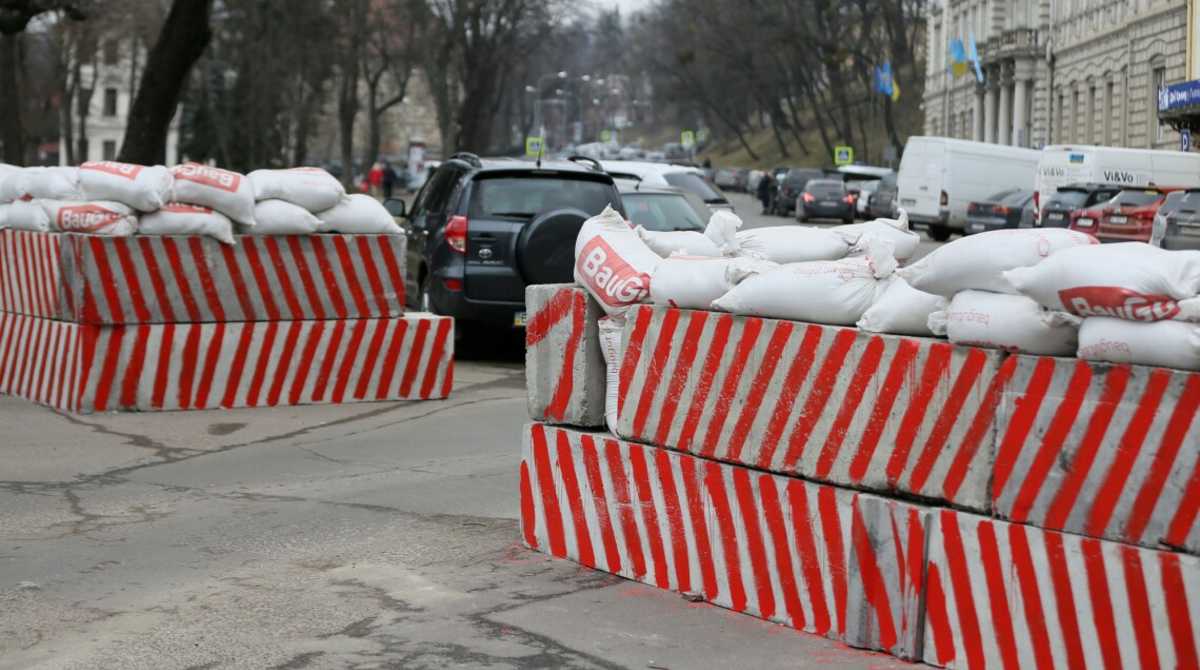
Before I could fully grasp the gravity of our situation, our driver said, “Hold on, ladies! We'll get you through!" And hold on we did, both literally and figuratively. Our convoy, plus those two buses [from Mariupol — translator’s note] turned around, and, instead of going back, took some dirt road in a field. The drivers collectively decided to try to get to Tokmak and Orikhiv by country roads. And so we began traveling along those unknown trails.
I mean, before the full-scale invasion, those dirt roads had likely been exclusively used by some agricultural machinery, some farmers going to their fields. And there we were, a convoy of six minibuses, several passenger vehicles, and two large buses from Mariupol, all traveling down that dirt road. But that wasn’t the scariest part, the scariest part was that nobody knew what lay ahead.
So we traveled down that first field road. The driver said, “This is where we were able to get through last week. Hope we’ll be lucky today, too.” But it turned out that another Russian roadblock emerged on that road, they had learned about that road and took over it. They didn’t let us pass. Neither did they shoot us, thank God.
There was some hope that one of those roads would eventually lead us to the Ukraine-controlled territory
We turned around, and I thought, did we really have to go back to that other roadblock? But we never reached that road to Zaporizhzha, for once again, we took a turn to another dirt road. For some time, everything seemed ok, I even thought that we almost made it.
And then we came across yet another Russian roadblock. And they, too, refused to let us through. One car reached the roadblock, just to learn that there was no passage. So the whole convoy — the minibuses, the passenger cars, and those two huge buses started backing out, and the drivers were back-pedaling. We had to turn around in that field, thank God, the weather was dry and nobody got stuck maneuvering like that.
Do you know how those roads between the planted trees are? With trees on one side and fields on the other? And it was already sprouting and starting to turn green. And the skies above were so bright, too bright for the situation we were in. And there was the unknown. Was there another Russian roadblock down that road? Would we have to turn back once again?
So, we were traveling down that third road, and the ride was longer than the previous two. I was starting to believe that we wouldn’t get through, and I did my best to drive those thoughts away, so it wouldn’t hurt later. One of the vehicles blew a tire, and everyone stopped and the tire was changed in mere minutes. Later another car broke down, yet others got it hooked and went on to tow it. No one was dumped, and the team spirit was very high. I mean, none of us had known each other before — except for the drivers of those four minibuses. But with the common goal, we all stood united. Nobody asked where you were going and why, people just had the goal and the will to move on.
We went back, and I lost track of whether we had already passed those places or not. We take yet another turn and see not even another dirt road, but rather some sort of deer trail. Everyone starts moving — except for the buses. Those were large and heavy, carrying many passengers, and they simply couldn’t pass, they were scratching their bellies against the ground, producing some grave screeching noises that I heard even from the inside of our minibus.
Everybody stops in their tracks, and the drivers of those buses start shouting that people needed to deboard the buses and walk, otherwise, they wouldn’t be able to go any farther. So people from Mariupol deboarded those buses and started walking by them, while the buses rather crawled than drove. People were walking along in that field.
That’s when the artillery shelling started, the Russians were shelling the Ukrainian side. We heard booms as the shells landed nearby, in the fields to our right, and they even landed as far as beyond those panted trees. We saw those explosions, that looked like the soil being torn to pieces and spattering like fireworks and then slowly falling.
Everyone had the same wish to stay away from the windows. And, apparently, everybody would rather be lying on the floor. But how many people could fit on the floor of a minibus, right? Only one. Therefore, everyone just squeezed into their seats, bending down as low as we could. I may have covered my head with my hands, I don’t remember.
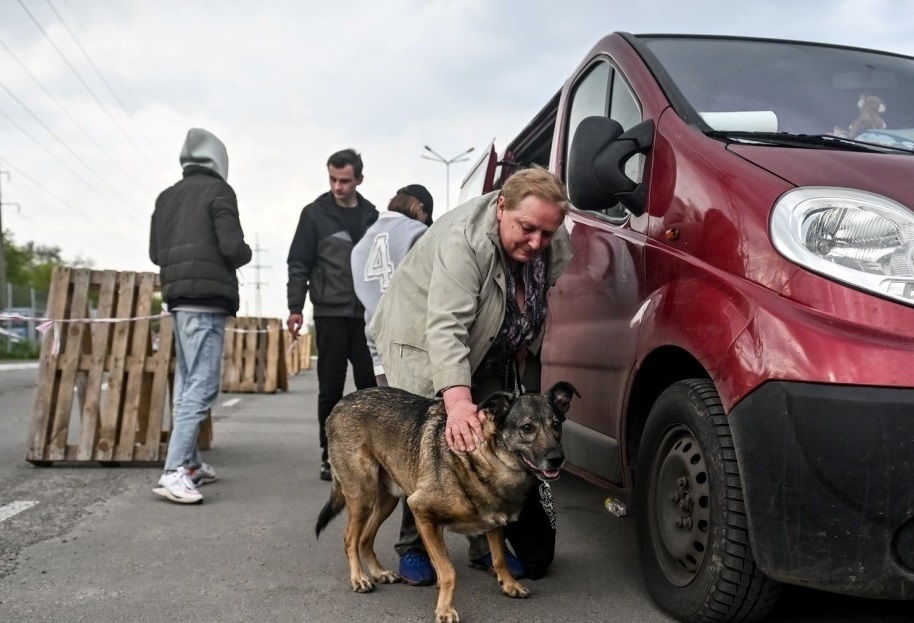
The driver said, “Don’t worry, we’ll get through, it’s going to be all right.” He even managed to joke about it: “Some valerian drops, anyone? Or you’d rather wait until we are out of here? Just say it, and I’ll stop and administer some valerian drops to anyone who needs it.”
It wasn’t the first they [the drivers — translator’s note] had to drive like that, so it was a routine situation for them. I don't know whether those meager UAH 3,000 per person were worth it, I just realize that one day they might not be so lucky to find that lifeline route.
To my understanding, we were traveling through the gray area. I have no idea how much the shelling lasted. The people from Mariupol were running, with their faces so focused. Those poor things had suffered before, and they [the Russians — translator’s note] wouldn’t even let them pass through uneventfully. There were a lot of them, the passengers from those two buses, both kids and adults. Each mother had 2 to 3 kids in tow, with most of the kids being younger than 7. Through our windows, we saw them running, and I realized that I was in a better situation than them, for I was being driven while they had to run.
So you stay on your ride, saying to yourself that that couldn’t last forever. Was there any hope that one of the roads would eventually lead to Ukraine-controlled territory? Of course, there was... I suppose. I don’t remember. All I know is that at that moment, intense fear prevailed.
Nobody was crying. It's just that everyone was in a state of shock when you are incapable of anything but fear. Emotions are appropriate when you have already lived through some situation, and your body is trying to relax. We spent 10 hours weaving in and out those dirt roads. As whole ten hours.
Long story short, we did make it, and we were greeted by the Ukrainian military. We arrived at some village — Luhove, I think, but I can be mistaken, and nobody stopped us any further on the Ukraine-controlled territory. So we reached Zaporizhzhia.
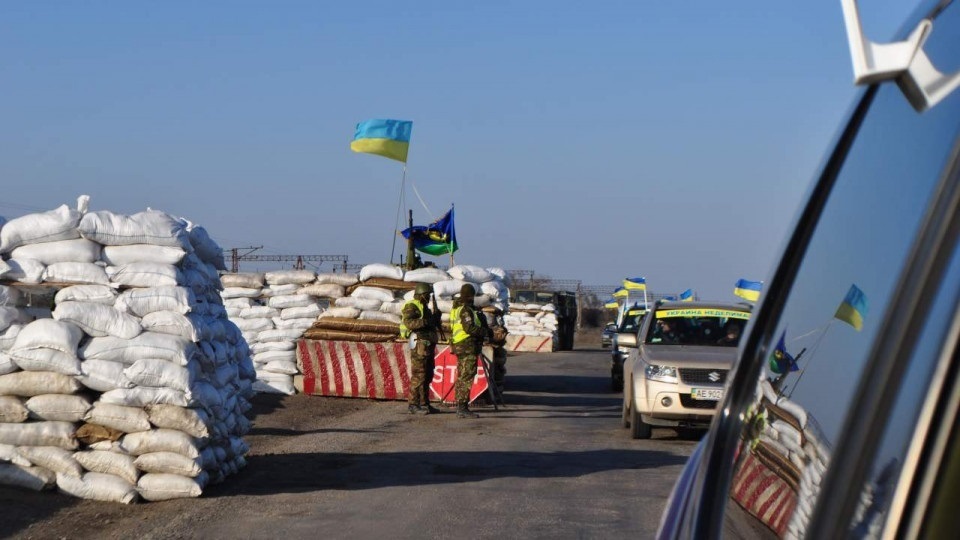
We were really happy to finally reach Zaporizhzha and meet our military, there was that overwhelming feeling of joy. Despite not knowing any one of them personally, we just felt some inexplicable joy — after the journey, we endured, after living under occupation, after having to deal with Russian soldiers. At long last, we were among our people.
It was the dead of the night, and we finally relaxed. We were in such intense fear while we traveled, that there was no place for other human feelings. And then the shock of fear passed, and for the first time since we hit the road, people felt thirsty. Some even managed to eat.
In Zaporizhzhia, I boarded an evacuation train and traveled further, to my mom’s. And for the first time since the full-scale invasion, I actually fell asleep.
My son is a Ukrainian border guard. On the night of February 23 to 24, he was on duty. I still don’t have accurate information as to what became of him. I managed to contact a young lady who had been on shift with him that night, and she told me that he was wounded and in captivity. As of today, that’s the only information on my son’s fate I have. My husband is in the military, too, he’s on the frontline now. I haven’t seen him in four months.


